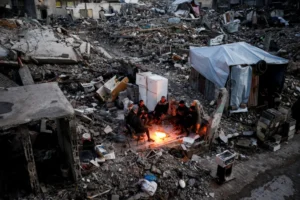Gaza urgently needs a more effective humanitarian approach

Palestinians gather near a fire next to the rubble of destroyed buildings in Jabalia refugee camp, northern Gaza , 13 February 2025
Othman Moqbel, CEO of Action For Humanity, writes in Al Jazeera on 19 February 2025:
The ceasefire agreement in Gaza has now held for a month. There have been critical moments and violations, but the mediators have so far managed to keep the deal alive. This has allowed many of the 1.9 million displaced people to move back to areas they had fled from, easing the strain on southern and central Gaza which had hosted large makeshift camps without the necessary infrastructure.
The ceasefire has certainly brought a sense of relief to the Gaza Strip, which has endured unimaginable suffering for 15 months. But for the families who have survived the relentless bombing and destruction, the battle is far from over.
They face a new war – one against poverty, hunger, homelessness, and despair. Homes lie in ruins, hospitals are overwhelmed, and schools are either destroyed or still shelter the displaced and homeless. Gaza has been set back by decades. Over the past weeks, we have seen aid access ramp up significantly into the Strip, particularly the north, which was besieged for months. But significant challenges remain.
On the ground, colleagues and friends report continued difficulties in accessing food, water, medicine and supplies. Distribution remains a key challenge due to damaged infrastructure, but it is not the only problem.
There are also still barriers to the entry of various essential items. The blocking of trucks carrying tents, mobile homes and heavy machinery for clearing rubble brought the ceasefire deal to near-collapse last week. Due to the absence of proper shelter, many Palestinian families continue to suffer harsh weather conditions across the Gaza Strip, but especially in the north, where the rate of destruction of civilian buildings is the highest.
Many of our colleagues are saying they have yet to see any sign of blankets or tents. They’re still exposed to the elements, unable to properly carry out their life-saving work.
